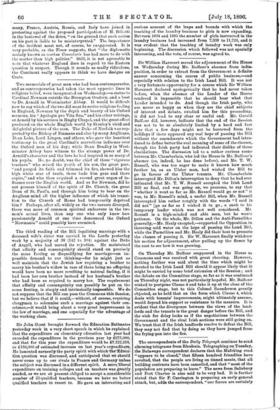Sir William Harcourt moved the adjournment of the House on
Wednesday during Mr. Balfour's absence from indis- position, in order to extract from the Government a definite answer concerning the course of public business,—and especially with relation to the Irish Land Bill. It was not a very fortunate opportunity for a course which Sir William Harcourt declared apologetically that be had never taken before, when the absence of the Leader of the House. rendered it impossible that he should hear what that Leader intended to do. And though the Irish party, who are never so happy as when they are the chief subjects of interest and debate, extolled him for this proceeding, it did not lead to any clear or useful end. Mr. Gerald Balfour did, however, indicate that the end of the Session was not to be so absolutely limited by a bard and fast date that a few days might not be borrowed from the- holidays if there appeared any real hope of passing the Bill without the amendments which the Government had intro- duced to define better the real meaning of some of the clauses,, though the Irish party had indicated their dislike of these- elucidations. The discussion led to a rather curious scene between Mr. Chamberlain, who led the House in Mr. Balfour's absence (as, indeed, he has done before), and Mr. T. W. Russell, who was too eager to make it known how much, further he, as an Ulster man, had wished the Bill to go in favour of the Ulster tenants. Mr. Chamberlain interrupted Mr. Dillon's interruption to deny that he had ever intimated that Mr. T. W. Russell accepted the Irish Land: Bill as final, and was going on, we presume, to say that "whether it went as far as Mr. Russell would go or not" it was, to Mr. Russell's mind, a useful Bill, when Mr. Russell. interrupted him rather roughly with the words "I said it did not" [go as far as I wished it to go, a snub to his temporary leader which was not well considered. Mr. Russell is a high-minded and able man, but he wants patience. On the whole, Mr. Dillon and the Anti-Parnellites generally,—Mr. Healy excepted,—supported the Opposition in throwing cold water on the hope of passing the Land Bill, while the Parnellites and Mr. Healy did their best to promote the chance of passing it. Sir W. Harcourt finally withdrew his motion for adjournment, after pulling up the flower by the root to see how it was growing.


































 Previous page
Previous page